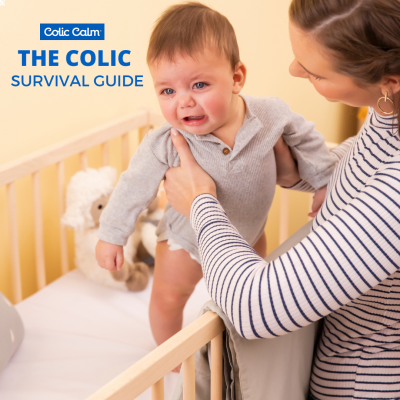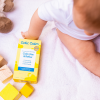Multivitamins for Babies

It’s a widely known fact that children and adults should take multivitamins for a health boost. But what about babies? Should your little one be taking multivitamins, as well?
It is comforting to know that your baby is getting sufficient nutrients to thrive. Consuming the recommended daily value of vitamins and minerals improves both physical and mental health. In fact, not getting enough necessary nutrients can stunt growth, affect brain development and weaken bones and teeth.
A daily multivitamin helps to fill the gaps in your baby’s nutrition. With the right multivitamin, you can be confident in your infant’s overall health and wellbeing.
Iron and Vitamin D Deficiency in Infants
Babies who are carried to full-term and are generally healthy do receive most of the vitamins and minerals they need through breastmilk or formula feeding, but they do not get enough Vitamin D and iron from breastmilk or formula alone.
Vitamin D is essential for building strong bones and teeth. Although sun exposure is a helpful way to absorb vitamin D, it is not recommended for babies under the age of six months and supplements are suggested as a better alternative. Doctors recommend that breastfed babies get 400 IU a day of Vitamin D from a supplement, starting the day they’re born. IU is an International Unit used to measure vitamins A, D and E. For vitamin D specifically, one microgram equates to 40 IU. Low levels of vitamin D are very common.
Iron is important because it moves oxygen from the lungs to the rest of the body. It also helps muscles store and use oxygen. It is important for a baby’s brain development and production of red blood cells. Iron deficiencies are very common, and babies need a whopping 11 mg of iron daily. Doctors recommend 1 mg/kg of iron supplements starting at four months for both breastfed and partially breastfed babies.
Other essential nutrients that your baby may be missing include Vitamin K, Vitamin B12 and Fluoride. Of course, every baby is different. But most babies need to be supplemented with vitamin D and iron, so a multivitamin is ideal.
Premature babies weighing less than 3.3 pounds need additional vitamins and minerals added to their breastmilk or formula. Premature babies should not begin taking a multivitamin supplement without the guidance and direction of your pediatrician.
How to Administer an Infant Multivitamin
Most multivitamins for children and adults come in capsules or gummies. For infants, multivitamins are made into a liquid that can be administered through a dropper. Simply use the dropper that comes with the packaging and squirt the liquid on the inside of your little one’s mouth between the cheek and the gums.
If your baby won’t take the vitamins from the dropper, you can mix them with a small amount of formula. It is not advised to mix a multivitamin with breastmilk. Do not heat the formula after adding the multivitamin as it is destructive to the vitamins. Fill the nipple with the liquid instead of the bottle so that your baby gets full dosage even if he or she doesn’t finish the bottle.
Why CoraCue?
Our multivitamin, CoraCue® Immune Support* Multivitamin, provides essential immune support with ingredients like aspalathin, zinc, vitamin D and iron. CoraCue has all the essential vitamins to support healthy growth and development in your little one.
CoraCue includes the following supplements with their functions:
1. Elderberry Fruit Extract – Antioxidant; has anti-inflammatory effects and reduces the severity of certain common infections.
2. Aspalathin – Antioxidant from the Rooibos plant; balances blood sugar levels, improves insulin resistance and glucose absorption.
3. Vitamin A – Needed for vision, healthy skin and mucous membranes, bone and tooth growth, immune system health.
4. Vitamin C - Antioxidant; Part of an enzyme needed for protein metabolism; important for immune system health; aids in iron absorption.
5. Vitamin D3 – Needed for proper absorption of calcium; stored in bones.
6. Vitamin E – Antioxidant; protects cell walls.
7. Thiamine – Part of an enzyme needed for energy metabolism; important to nerve function
8. Riboflavin – Part of an enzyme needed for energy metabolism; important for normal vision and skin health.
9. Niacin – Part of an enzyme needed for energy metabolism; important for nervous system, digestive system, and skin health.
10. Vitamin B6 – Part of an enzyme needed for protein metabolism; helps make red blood cells.
11. Vitamin B12 – Part of an enzyme needed for making new cells; important to nerve function.
12. Iron – Used to make hemoglobin; helps carry oxygen to all parts of your body.
It’s important to note that CoraCue contains iron. Many multivitamins leave out this very important mineral.
In addition to the above ingredients, CoraCue is free from sugar, gluten, wheat, soy, dairy and animal products and does not contain artificial flavors or colors.
Why Mom Should Also be Taking a Multivitamin
As a mother, your breastmilk’s vitamin and mineral content comes from the foods that you eat. While breastfeeding, you should be eating 200 more calories per day than when you were pregnant. It is recommended that you eat:
• 2 to 3 servings of protein
• 1,300 milligrams of calcium
• 10 milligrams of iron
• 115 milligrams of vitamin C
These are a lot of nutrients to intake in one day from food alone, so multivitamins are helpful. According to ucsfhealth.org, breastfeeding mothers “need to take some sort of daily multivitamin that contains 100 percent of the recommended dietary allowance (RDA).”
Prenatal vitamins are ok to continue to take while breastfeeding, but they do contain much more iron than necessary. Switching to a general multivitamin that contains 100 percent of the RDA is recommended.
*Precautions: As with all supplements, consult your healthcare provider before use. Do not exceed dosage. Keep out of reach of children. Accidental overdose of iron-containing products is a leading cause of fatal poisoning in children under six.
Works Cited
https://www.happyfamilyorganics.com/learning-center/baby/supplements-and-vitamins-for-your-baby/
https://www.eatright.org/food/vitamins-and-supplements/dietary-supplements/4-infant-supplements-to-ask-your-pediatrician-about
https://www.whattoexpect.com/first-year/feeding-your-baby/vitamins-and-babies.aspx
https://www.mayoclinic.org/healthy-lifestyle/childrens-health/in-depth/iron-deficiency/art-20045634#:~:text=Why%20is%20iron%20important%20for,children%20is%20a%20common%20problem.
https://www.saintlukeskc.org/health-library/discharge-instructions-giving-your-newborn-liquid-vitamin-supplements
https://www.healthlinkbc.ca/health-topics/ta3868
https://www.verywellhealth.com/elderberry-for-colds-and-flu-can-it-help-89559
https://www.viridian-nutrition.com/blog/nutrition-news-and-views/what-does-an-iu-measure-in-vitamins
 Canada
Canada South Africa
South Africa UK
UK EU & Int
EU & Int Ireland
Ireland Australia
Australia Brazil
Brazil New Zealand
New Zealand


















Comments